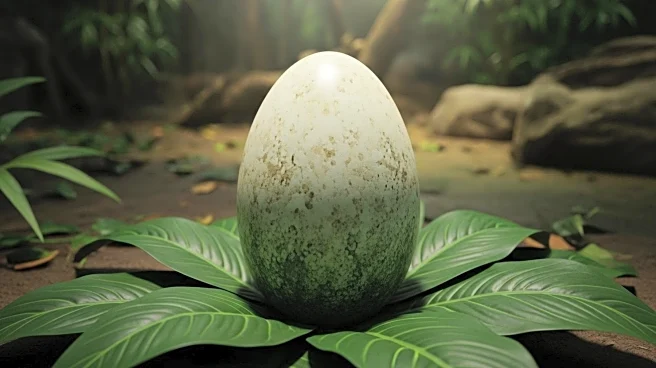What's Happening?
A female casque-headed iguana at the Exotic Zoo in Telford, England, has given birth to eight hatchlings through parthenogenesis, a rare reproductive process where unfertilized eggs develop into embryos. This phenomenon, known as a 'virgin birth,' results in offspring that are genetic clones of the mother. The iguana's hatchlings are currently being cared for in the zoo's reptile nursery, with plans for public display. Parthenogenesis is an uncommon occurrence in reptiles, with similar cases documented in stingrays and sharks. The zoo sees this event as an opportunity to educate visitors about genetics, evolution, and reptile conservation.
Why It's Important?
The occurrence of parthenogenesis in reptiles is significant for understanding genetic diversity and reproductive strategies in the animal kingdom. This rare event provides insights into how species can adapt to environmental pressures and challenges, potentially aiding conservation efforts for endangered reptiles. The iguana's virgin birth also serves as a platform for public education on genetics and evolution, highlighting the importance of scientific research in understanding biodiversity. This discovery may influence future studies on reproductive biology and the mechanisms that enable parthenogenesis in various species.
What's Next?
The Exotic Zoo plans to showcase the iguana hatchlings to the public, using the event to promote awareness about reptile conservation and the challenges they face in the wild. Researchers may continue to study the genetic makeup of the hatchlings to better understand the implications of parthenogenesis on genetic diversity. This could lead to further investigations into the potential for parthenogenesis in other reptile species and its role in evolutionary adaptation.
Beyond the Headlines
The iguana's virgin birth raises questions about the role of parthenogenesis in species survival and adaptation, particularly in environments where mates are scarce. This phenomenon challenges traditional views on reproduction and genetic inheritance, offering a unique perspective on evolutionary biology. The ethical considerations of using parthenogenesis in conservation strategies also warrant discussion, as it may impact genetic diversity and ecosystem balance.









